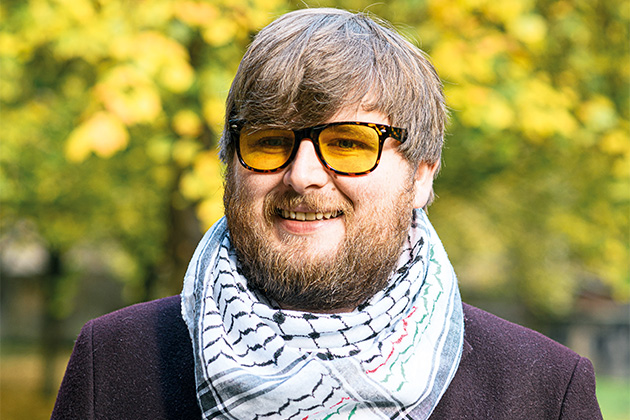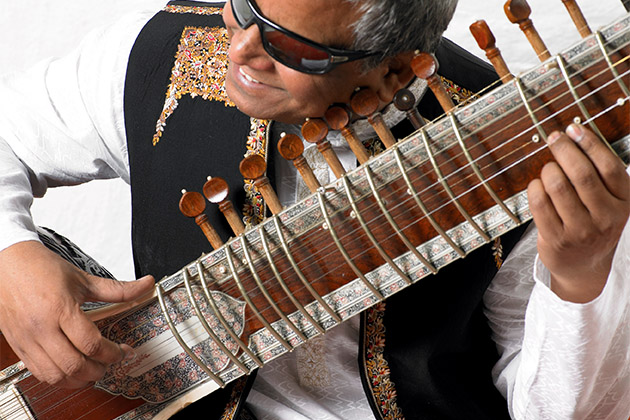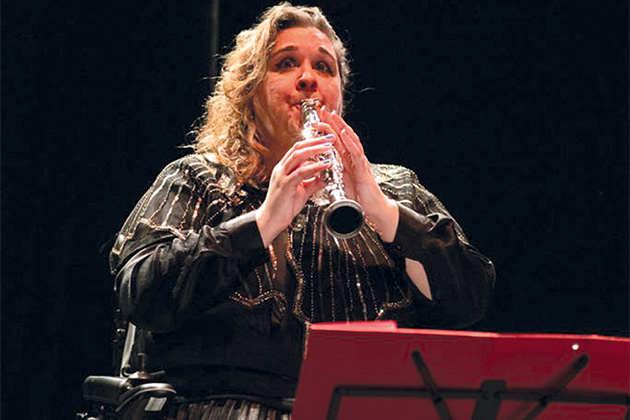For many musicians with disabilities, lockdown has been a perfect storm of mental, physical and financial disruption. The pandemic has magnified the problems they face as artists, and the obstacles and negative attitudes that confront them in everyday life. But it has also highlighted innate qualities of resilience and creativity, and hinted at new and better ways of working which have the potential to make the post-Covid industry more accessible and inclusive.
Ben Lunn, who has autism, is a highly regarded young composer with a growing international reputation. The emergency hit his work hard, and fast. A theatre project in the UK was cancelled in its entirety. Two premieres of his work in the United States were scrapped, and a residential summer school project in Antwerp was reduced to a series of Zoom conversations.
Issues of accessibility for the deaf and visually impaired
“If we had gone into this from day one knowing how long it was going to last, maybe it would have been easier to mentally plan,” he says. “But because things are changing so rapidly from week to week, the insecurity means we can’t take advantage of that time we have been given.”

“Obviously, I need to have quite a hermetic lifestyle, and I am quite lucky in the sense that my disability is more to do with fatigue and interaction. Using sites like Zoom works very well for me, but for visually impaired or deaf musicians it can be impractical, and that instant shift to online without considering issues of accessibility has
just left them out.”
Prejudice in the pandemic: how disabled musicians were made to feel disposable
For Lunn, one of the most distressing effects of the pandemic has been how it has reinforced what he sees as the deep-rooted prejudice against the disabled.
“I haven’t felt too much isolation personally, but there’s been a real underlining of what our value is in society,” he says. He points to the scandal of Do Not Resuscitate (DNR) forms being sent to disabled people once they had contracted Covid-19. “It’s as if, being disabled, we wouldn’t want to be resuscitated,” he says. “And there’s the fact that many disabled people weren’t getting support straight away, and this idea that the ‘weak’ would die, but the economy would keep going.”
His view was echoed by Drake Music, a charity campaigning for disabled musicians. It is also deeply concerned about public attitudes. “Musicians have said to me they feel disposable. Being sent DNR forms to sign is unconscionable,” says Drake communication officer, Becky Morris Knight.
Disabled people are being ‘written out of the story’
“The pandemic has uncovered a lot of ableism in how society is set up. In much the same way as the Black Lives Matter movement is revealing structural racism, I think the pandemic is revealing the structural ableism. There’s a danger that the coronavirus will take us backwards. With the language about disabled people being ‘vulnerable’ and ‘at risk’ there’s a sense that disabled people are being written out of the story.”
She explains that the bewildering speed at which the crisis has developed has made life especially hard for musicians with mental health issues. “We’re seeing a lot of overload and fatigue. One musician we work with has ADHD and is autistic, and that pace of change and the switch to digital has created many moments of overload for her. That’s been challenging because routines have been disrupted. If everything is moving really fast it can leave you feeling on the back foot. The rapid changes are a lot to cope with.”
Anxiety over social distancing
MU Equality, Diversity and Inclusion Official John Shortell says disabled people who need personal assistants have also been facing particular problems. “There’s anxiety for them about whether their assistants are observing social distancing,” he says.
Some people have had to find new PAs during lockdown as their usual PA has been ill or had to shield. This has left some members with little or no support.
John says there are specific financial issues facing self-employed disabled musicians who may lose vital government Access To Work grants if they claim Employment Support Allowance or Universal Credit. He says the Access to Work scheme enables them to pay for specialised roadies, drivers or other helpers, but it has to be applied for every year, and is subject to stringent rules.
New legislation may mean minimal or no support
“Access To Work grants are an essential part of disabled people overcoming the barriers they face finding work,” says John. “Losing the grants would mean having to re-apply, a process that is complicated for freelancers and can take up to six weeks.”
He also levels criticism at the Coronavirus Act 2020 – the legislation rushed through parliament giving the government emergency powers in the crisis. The Act contains a clause that allows local authorities to suspend duties to provide care for disabled people unless it is a breach of their human rights. “In reality, the situation would have to be extremely severe for it to qualify as a breach of human rights, meaning disabled people could be left with minimal or no support,” he says.
Why disabled musicians experience “double lockdown”
Renowned sitar player and multi-instrumentalist Baluji Shrivastav, who is totally blind, describes the plight of disabled musicians during the pandemic as a “double lockdown”. An accomplished recording artist, teacher, and sought-after session player, he is also the founder of the Inner Vision Orchestra, a group of players from diverse backgrounds who are all blind or partially sighted.

“We can’t go out and about, and we can’t really get together and do music. Sound is the medium for blind people, and not being able to play music with other blind people effects their sense of identity,” he explains. “Members of the orchestra are being mentally affected because they are very lonely. Sometimes they cry over the phone to me because of this. They are locked down because of the coronavirus, and they are also locked down by their disability.”
How musicians with disabilities are turning the situation around
Online has been a lifeline though, he says. Baluji has helped to arrange a series of web concerts featuring solo performances by members. “We have been trying to turn the situation around so our players have the chance to show off their talents, in the hope that they can get work later.”
But he is worried that, when normality begins to return, disabled musicians will be the last to benefit. “The less people see of blind musicians and know about them, the less likely they are to get work when it reappears. In the music business, unless you have a presence, someone else is going to get the job instead of you. On the whole, people don’t know where to find these musicians, and they are not that good at promoting themselves. This is why the Inner Vision Orchestra exists.”
Embracing the online opportunity
Heidi McGeough is registered blind, and a singer and music teacher from Merseyside. She has been on her own throughout the lockdown, nursing a broken arm, which has compounded her problems. “I did my last gig in the pub at the top of my road on the 6 March,” she recalls. “It was a brilliant night, and when I think of it now, I get very emotional. When can it be like that again?”
But like thousands of other musicians, she’s been helped by embracing the opportunity to go online. She performs live every week on a local Facebook group with 20,000 members. “I was really spiralling mentally, I had nothing,” she says. “But going live online makes me get make-up on, get changed into something pretty, learn new songs, and makes me make an effort once a week. It’s been a godsend.”
Adopting a problem-solving approach
Sonia Allori is a composer, multi-instrumentalist and music therapist who has partial hearing and uses a wheelchair. She says some of the problems she has encountered during lockdown have been expected, while others have been a shock.
“I’m a fairly resilient soul, and this hasn’t changed, except that I’ve had to dig deeper into that resilience, and to adopt a flexible problem-solving approach to creating new work and building networks in new ways,” she says. “One of the biggest challenges was to secure captioning services for meetings and rehearsals when working online. For the first month or so this took time to set up, but has now become the new norm, if you like.
I think everyone was in shock for the first few weeks, then had a quick period of mourning for all the lost work, and then moved into damage-control mode. I guess this closely mirrors what has happened in many other sectors too.”
Assessing the legacy of lockdown for freelance disabled musicians
While it’s been particularly difficult for freelance disabled musicians to find new income streams and navigate the government assistance schemes, Sonia has been impressed by the amount of cooperation she’s encountered. She says there’s been a genuine sense of everyone rallying to help one another. “The next thing to worry about is the legacy of the impact that lockdown will have on the performance and theatre sectors, and if everything will reopen, and what that will look like. It’s difficult to imagine this at the moment. But it also helps if disabled artists, directors and performance makers are represented at the table in those high level new cultural policy conversations for post-Covid UK.”

Finding new ways of learning in the Zoom-enabled workplace
So, will something good emerge for the disabled music sector, in the wake of coronavirus? Drake Music’s Becky Morris Knight thinks it might. She is hopeful that some of the new ways of working established during the crisis will become permanent.
“Things have become much more accessible than normal,” she states. “The switch to online means that disabled musicians who normally couldn’t attend an event can now do so. We have also seen that there has been positive action across music and the arts to try to make online work accessible. For example, bringing captions to a Zoom event so the hard of hearing can still connect with what is going on. When people were rushing to put things online, issues around access were being forgotten, but then we and other organisations did some campaigning around that and suddenly there was a big effort to understand what good access looks like online.”
“It is really exciting, although, of course, the worry is that it will go away when we return to normal”.